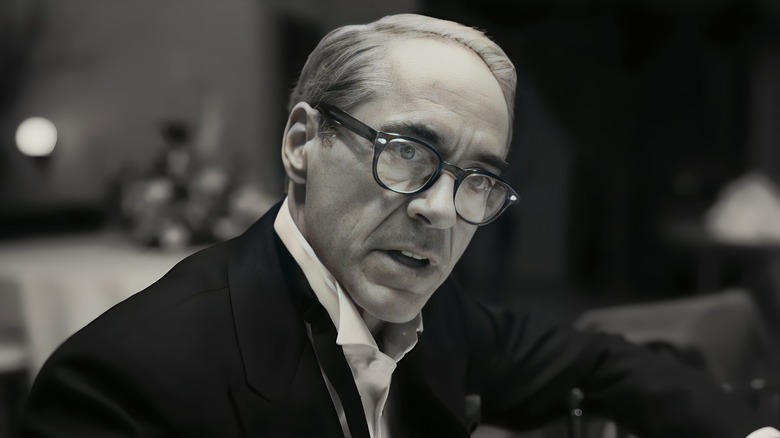No, Oppenheimer Does Not Transform Its Main Character Into A Hero - Here's Why
Many moviegoers venturing to their local theater this weekend to witness Christopher Nolan's "Oppenheimer" likely harbored the same ethical anxieties: would one of the most celebrated filmmakers of our time really seek to transform the scientist responsible for the creation of the world's most destructive weapon into a cinematic hero?
Thankfully, Nolan seems acutely aware of the harm his subject has done, perhaps even more so than the average audience member. The film spends no shortage of time charging Cillian Murphy's J. Robert Oppenheimer — as well as the U.S. government and military — with the deaths of over 200,000 innocent human beings in Hiroshima and Nagasaki. It even goes as far as to acknowledge the dubiousness of the belief that Japan's surrender hinged entirely on the bomb's success. Historically, there has been much debate that the country was already suing for peace before they were attacked by the U.S. — in today's context, this would technically make the bombings war crimes.
Yet, "Oppenheimer" goes even further by suggesting that its titular physicist is not only responsible for those lives but also for all that will be lost in an impending nuclear apocalypse. From his perspective in the film, his success with the Manhattan Project gave mankind everything it needed to destroy itself — and for what? What could he have gained from unleashing such destruction? "Oppenheimer" offers two theories, and neither of them portrays him as a hero.
Oppenheimer is an entirely subjective film
Sharing the box office with "Oppenheimer," "Barbie" offered one of 2023's most resonating cinematic slogans: "If you love Barbie, this movie is for you; if you hate Barbie, this movie is for you." A similar maxim could be applied to "Oppenheimer." The film presents two distinctly subjective points of view that encompass a range of perspectives on the man himself, each arriving at its own unflattering conclusion about why he did what he did.
One half displays Oppenheimer's life through his own perplexed eyes as he tries to justify his actions to the United States Atomic Energy Commission (AEC) during his security hearing. Listening to him, you would walk away with the understanding that he delivered the bomb to America out of fear, patriotism, and a self-interested pursuit of scientific achievement — motivations that, while sympathetic, are obliterated through literal and figurative interrogations from other characters in the film.
The other half presents his life story from the perspective of his greatest adversary, Lewis Strauss (Robert Downey Jr.). Even though he is depicted at various times as a paranoid, petty, and power-hungry politician, his beliefs about Oppenheimer's motivations are never outright dismissed. Through Strauss' eyes, we see the possibility that Oppenheimer may have been driven entirely by arrogance and ego — suggesting even his supposed moral objections to the bomb's use were nothing but hollow handwringing meant to solidify his own power in the American scientific and political communities.
These two halves of "Oppenheimer" voice nothing but harsh criticisms of the film's central character, and rightfully so. Even if it leaves you in awe of all that was accomplished by his genius, it also imparts an uneasy feeling that the world would have been better off if he'd stayed in the lab.

